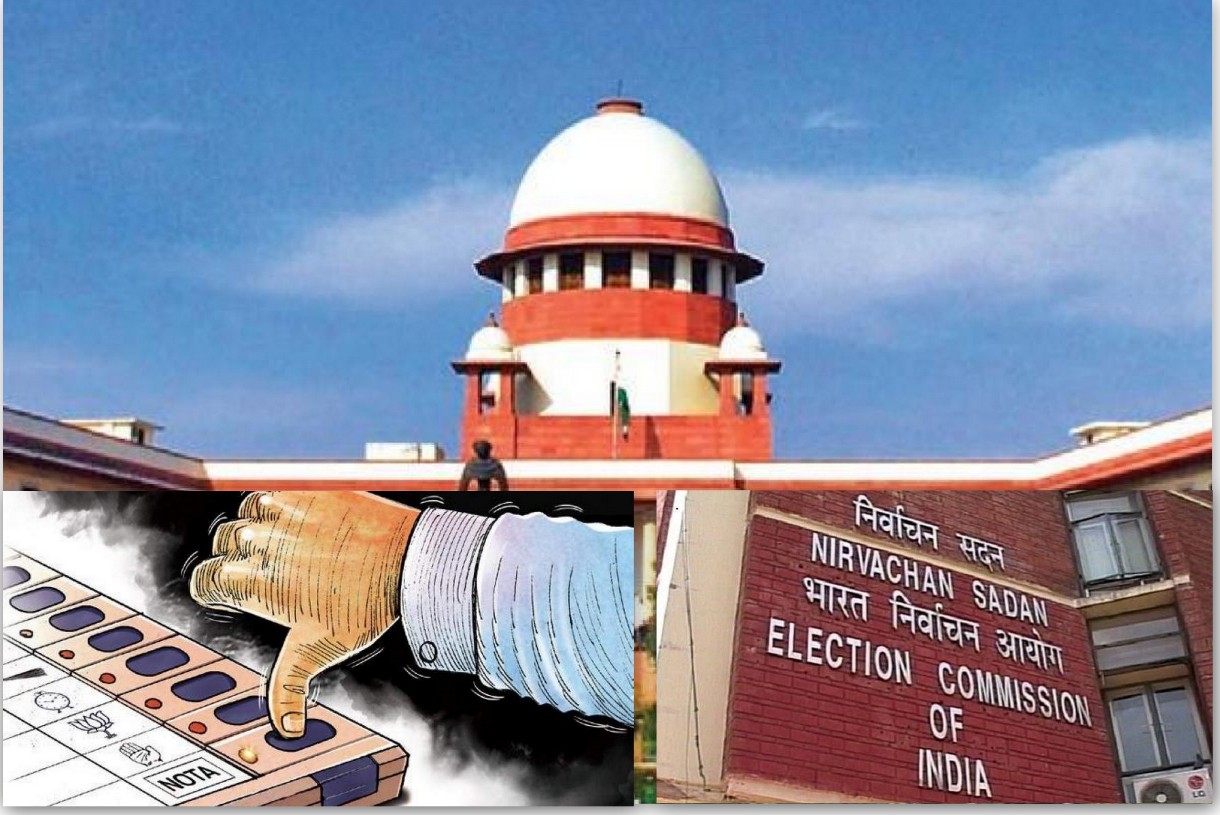On Monday, Supreme Court of India sought response from the Central government and the Election Commission on a plea seeking to direct the poll panel to nullify an election result and conducting a fresh poll if the maximum number of votes are for ‘None of the above’ (NOTA) in a particular constituency.
Notices were issued to the Ministry of Law and Justice and the Election Commission of India while seeking their replies on the plea by a bench comprising Chief Justice S A Bobde and Justices A S Bopanna and V Ramasubramanian.
On behalf of the petitioner, Senior advocate Maneka Guruswamy appeared.
A plea filed by advocate and BJP leader Ashwini Kumar Upadhyay which also sought a direction to the Election Commission to restrict those candidates and political parties, whose election has been nullified, from taking part in the fresh poll, was heard by the Apex Court.
The petition said, “The right to reject and elect a new candidate will give power to the people to express their discontent. If voters are dissatisfied with the background or performance of the contesting candidate, they will opt for NOTA (none of the above) to reject such candidate and elect a new candidate.”
The SCI issued the notice on the PIL which intends to direct the ECI to use its plenary power under Article 324 of the Indian constitution to nullify the election result & hold fresh elections, in case the maximum number of votes are polled in the favour of NOTA option in a particular constituency, and subsequently restrict the candidates who had participated in the invalidated election from contesting the fresh election.
Appearing on behalf of the petitioner, Senior Advocate Menaka Guruswamy submitted that though the petitioner has approached the statutory authorities, he has not received any response.
Also Read: NOTA- vote of discontent for all candidates and right to its secrecy-is it meaningless
In 2013, the human rights body- People’s Union for Civil Liberties had filed a writ petition to provide for the right of the voters to reject all the candidates. PUCL is a body formed by the prominent leader of emergency times, Jayaprakash Narayan in 1976, the same year which saw the passing of the 42nd constitutional amendment act, colloquially known as the mini-constitution. In its judgment, the Supreme court bench with three judges, the then chief justice of India P Sathasivam, Justice Ranjan Gogoi and Justice Ranjana Prakash Desai provided for the right to choose ‘None of the above’ candidates standing in polls to the voters. It also expanded the idea or the principle of secrecy to the vote of NOTA.
Before India, there had been 13 countries that provided for ‘None of the above’ for their voters. Some prominent examples of countries having this provision are Belgium, Greece, France, Chile, and Bangladesh. Countries like Sweden and Finland provide for a blank vote and write-in option where the voter can write the name of someone, she/ he might know, or even a fictional name. The state of Nevada in the United States of America provides for NOTA. Spain and Columbia also provide for the ‘None of the above’ vote provision in the form of blank vote to their voters. Hence, we see that the exact nature of the NOTA varies from one country to another from negative, neutral, or protest type or even putting forth someone’s name.
This can be a chance for the Election Commission to repose the faith of the electorate in a voting system that cancels out candidates in a constituency that had the maximum number of votes in the option of NOTA, which can, in turn, lead to the institutionalization of the right to reject.





